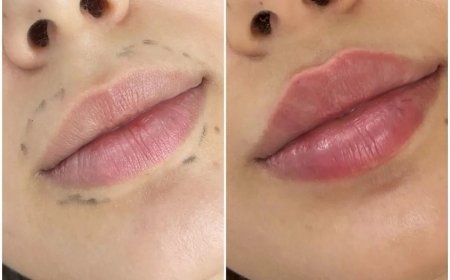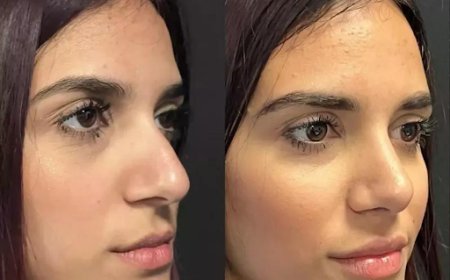How to Choose the Right Obesity Treatment in Dubai
Explore effective obesity treatment Dubai options, including costs, results, and FAQs to help you achieve sustainable weight loss and improve your health.

Obesity treatment Dubaiis a growing concern, as obesity rates in the UAE continue to rise due to sedentary lifestyles, poor dietary habits, and environmental factors. Choosing the right obesity treatment is critical for achieving sustainable weight loss and improving overall health. This article will explore various obesity treatment options available in Dubai, the cost of these treatments, what to expect before and after the procedure, and provide answers to frequently asked questions.
Understanding Obesity and Its Risks
Obesity is a medical condition characterized by excessive body fat that can lead to serious health problems. It is commonly assessed using theBody Mass Index (BMI), with a BMI of 30 or higher indicating obesity. Obesity is associated with several health risks, including:
- Heart disease
- Type 2 diabetes
- High blood pressure
- Sleep apnea
- Joint problems
- Certain types of cancer
In Dubai, the prevalence of obesity is rising, and seeking professional guidance to manage weight and reduce these risks is crucial for maintaining a healthy lifestyle.
Choosing the Right Obesity Treatment Dubai
There are several effective treatments for obesity, ranging from lifestyle changes and medical interventions to surgical procedures. Here are some of the most common obesity treatments available in Dubai:
1. Lifestyle Modifications
For many individuals, the first step in managing obesity is through lifestyle changes, which can include:
- Dietary changes: A balanced diet rich in fruits, vegetables, lean proteins, and whole grains is essential for weight loss. Reducing intake of processed foods, sugars, and unhealthy fats is a key part of any successful weight loss program.
- Exercise: Regular physical activity is crucial for burning calories and improving overall health. A combination of aerobic exercises (such as walking, running, or swimming) and strength training can be particularly effective.
- Behavioral therapy: Working with a nutritionist or counselor can help address emotional eating, improve food-related behaviors, and ensure long-term success.
While these treatments may be effective for some, others may require additional interventions such as medications or surgery.
2. Medications for Obesity
In some cases,obesity treatment Dubaimay involve the use of prescription medications that help reduce appetite, block fat absorption, or increase metabolism. Some common medications include:
- Orlistat: Blocks the absorption of fats in the intestines.
- Phentermine: Suppresses appetite and promotes weight loss.
- Liraglutide: Helps with appetite control and weight loss by mimicking hormones that regulate blood sugar.
These medications are often recommended in conjunction with a healthy diet and regular exercise and may be used for individuals with a BMI of 30 or higher or those with related health issues such as diabetes or high blood pressure.
3. Weight Loss Surgery (Bariatric Surgery)
For individuals with severe obesity or those who have not been successful with other treatments, bariatric surgery may be an option. There are several types of weight loss surgeries available in Dubai:
- Gastric Sleeve (Sleeve Gastrectomy): Involves removing a large portion of the stomach to reduce its size, limiting the amount of food you can consume.
- Gastric Bypass: Diverts food away from the stomach and small intestine, reducing calorie absorption and promoting weight loss.
- Adjustable Gastric Band (Lap-Band): Involves placing a band around the stomach to limit food intake by creating a smaller stomach pouch.
These surgical options are typically recommended for individuals with a BMI of 40 or higher or those with a BMI of 35 or higher with associated health conditions such as diabetes or hypertension.
4. Non-Surgical Weight Loss Procedures
In addition to bariatric surgery, there are non-surgical obesity treatment options available in Dubai, including:
- Endoscopic Sleeve Gastroplasty (ESG): A minimally invasive procedure that reduces the stomach size using an endoscope, promoting a feeling of fullness with smaller portions.
- Intragastric Balloon: A balloon is placed in the stomach to reduce its capacity, helping individuals eat less and feel fuller.
These treatments are less invasive than traditional surgery and may be suitable for individuals who want to lose weight without undergoing a major procedure.
Cost of Obesity Treatment Dubai
The cost ofobesity treatment Dubaican vary greatly depending on the treatment method you choose. Heres a general breakdown:
- Lifestyle modification programs: AED 1,000 to AED 5,000 per month for nutrition counseling, fitness programs, and behavior therapy.
- Prescription medications: AED 150 to AED 500 per month, depending on the type of medication and whether insurance covers the cost.
- Bariatric surgery: The cost of weight loss surgery can range from AED 25,000 to AED 80,000, depending on the procedure and the hospital.
- Non-surgical weight loss procedures: Costs for procedures like ESG or intragastric balloon placement typically range from AED 15,000 to AED 30,000.
These costs can vary based on the healthcare provider, location, and any additional services or follow-up treatments required. Health insurance may cover part of the cost, so its important to check with your insurance provider.
Before and After Results of Obesity Treatment Dubai
Before Treatment:
- High BMI: Individuals with a BMI of 30 or higher are at risk of developing related health conditions such as heart disease, diabetes, and joint pain.
- Struggles with weight loss: Many individuals have difficulty losing weight through diet and exercise alone.
- Health complications: Obesity can lead to a range of chronic conditions, including high blood pressure, high cholesterol, and insulin resistance.
After Treatment:
- Significant weight loss: Most treatments, especially bariatric surgery, can lead to significant weight loss, improving overall health and reducing the risk of chronic conditions.
- Improved mobility: Weight loss can reduce strain on joints, making movement easier and less painful.
- Better cardiovascular health: Weight loss can help reduce high blood pressure, lower cholesterol, and improve heart health.
- Improved quality of life: As weight decreases, many individuals experience increased energy, improved self-esteem, and a better quality of life.
5 Frequently Asked Questions (FAQs)
1. How do I know which obesity treatment is right for me?
The right treatment forobesity treatment Dubaidepends on factors such as your BMI, health conditions, and previous weight loss attempts. Consulting with a healthcare provider or specialist is the best way to determine the most suitable treatment for your needs.
2. Are weight loss medications safe?
When prescribed by a doctor, weight loss medications can be safe and effective. However, they should be used in conjunction with a healthy diet and regular exercise. Always consult a healthcare provider before starting any medication.
3. What are the risks of bariatric surgery?
Like any surgery, bariatric surgery carries risks such as infection, bleeding, blood clots, and complications from anesthesia. However, the benefits of weight loss and improved health generally outweigh these risks for those with severe obesity.
4. How much weight can I expect to lose with bariatric surgery?
Bariatric surgery typically results in a weight loss of 50% to 70% of excess body weight within the first year, although this varies depending on the individual and the type of surgery.
5. Can I maintain the weight loss after surgery?
Sustaining weight loss afterobesity treatment Dubairequires ongoing lifestyle changes, including a balanced diet, regular exercise, and behavioral modifications. Long-term success is achievable with commitment and support.
Conclusion
Obesity treatment Dubaioffers a variety of solutions for individuals looking to lose weight and improve their health. Whether through lifestyle changes, medications, non-surgical procedures, or bariatric surgery, there is a treatment option for every need. By understanding the costs, treatment options, and expected results, you can make an informed decision and take the first step toward a healthier future. Its important to work with a qualified healthcare provider to determine the best treatment plan based on your unique needs and goals.








































